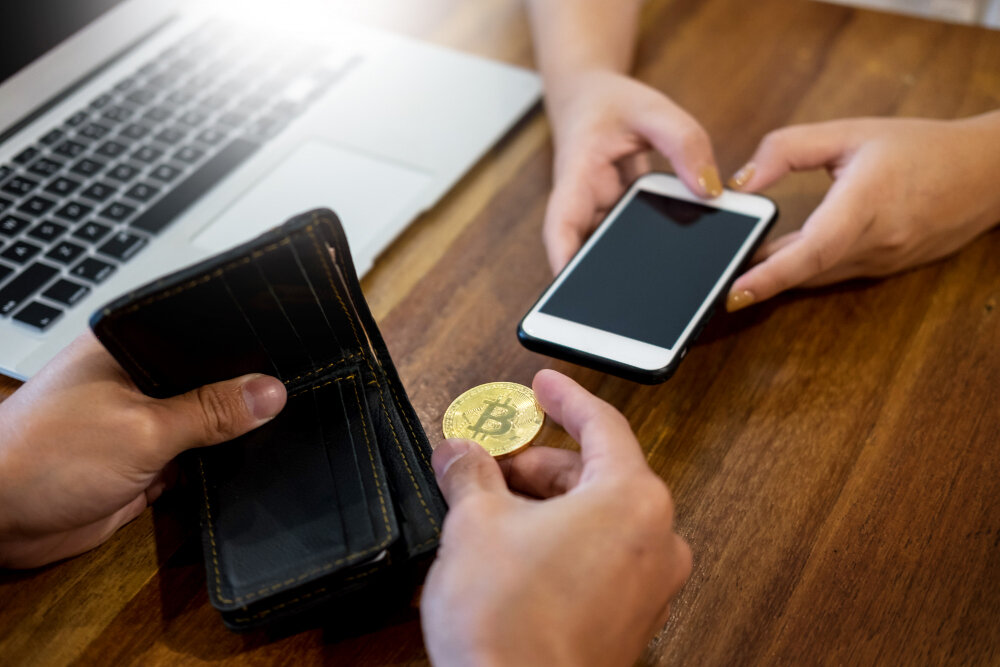Security and managing digital assets are paramount for every investor or user of cryptocurrencies. "Can you send crypto to a wallet?" is a common and crucial question, particularly for the cryptocurrency world's beginners looking to handle these digital assets effectively. We will explore what it means to send cryptocurrencies to a wallet, how to do it securely, and the various wallet options available.
Understanding Cryptocurrency Wallets
In the vast and ever-evolving ecosystem of cryptocurrencies, a cryptocurrency wallet is a fundamental cornerstone. It is imperative to gain a profound understanding of what a cryptocurrency wallet truly is and the pivotal role it plays. At its core, a cryptocurrency wallet can be considered a digital interface, an electronic safe designed to facilitate cryptocurrencies' storage, management, and utilization. The bridge connects you to your digital assets, allowing you to engage in the intricate world of crypto transactions with ease and security. Let's delve into the essence of a cryptocurrency wallet, starting with its fundamental functions. These wallets serve as the gatekeepers of your digital wealth, allowing you to receive, store, and send cryptocurrencies. To achieve this, they rely on a duo of cryptographic elements: public addresses and private keys. Public addresses act as the digital equivalents of your bank account numbers, enabling others to send cryptocurrencies to you. On the other hand, private keys, akin to digital signatures, grant you access to your stored funds and allow you to authorize outgoing transactions. Now, let's explore the diverse array of cryptocurrency wallets, each tailored to different preferences and needs.
Software Wallets: These are digital applications or software programs that can be installed on your computer or mobile device. They are revered for their accessibility and user-friendliness, making them an excellent choice for individuals seeking to use cryptocurrencies in everyday transactions.
Hardware Wallets: Hardware wallets, on the other hand, are tangible, physical devices engineered solely to safeguard cryptocurrencies. Their design prioritizes security, making them a favored option for long-term storage and protecting substantial digital assets.
Mobile Wallets: Mobile wallets come in the form of smartphone applications, offering the utmost convenience for those who wish to manage their crypto assets while on the move. They strike a harmonious balance between accessibility and security, catering to the needs of the modern mobile user.
Paper Wallets: In contrast, paper wallets represent a more traditional approach to crypto storage. They involve generating and printing your cryptocurrency's public and private keys on a physical document, often as QR codes. Paper wallets are celebrated for enhanced security, as they exist offline and are impervious to digital threats. In the world of cryptocurrencies, security is paramount. Still, it's worth noting that different wallet types come with varying levels of security measures, ranging from encryption techniques to backup strategies and even the introduction of "seed phrases" that serve as a safeguard against the risk of losing access to your wallet. You will possess a holistic understanding of the multifaceted nature of cryptocurrency wallets. You will recognize their pivotal role within the cryptocurrency ecosystem, setting the stage for our exploration of secure cryptocurrency transactions and the journey of sending your digital assets to these wallets.
Sending Cryptocurrency to a Wallet
In our journey through the cryptocurrency world, we've discovered cryptocurrency wallets' intricate nature and diverse types. Can you send crypto to a wallet? Let's explore deeper into the captivating process of sending cryptocurrency to a wallet, unraveling the inner workings of digital asset transfers. Sending cryptocurrency is akin to a digital transfer of ownership. Picture it as packaging a virtual envelope filled with digital coins and sending it to a specific destination.
The Key Components
To execute a successful cryptocurrency transfer, it's imperative to comprehend two fundamental components:
Recipient's Wallet Address:This alphanumeric code serves as the digital equivalent of a mailing address. It uniquely identifies the recipient's wallet in the vast cryptocurrency network. The utmost care must be taken when entering this address, for even a single character mistake can result in the irreversible loss of your cryptocurrency.
Private Key: As the sender, you wield your wallet's private key as the cryptographic signature authorizing the transfer. This key, held securely within your wallet, ensures that only you retain control over your valuable assets, fortifying the process with an essential layer of security.
Sending cryptocurrency entails a series of well-defined steps, which generally include:
Accessing Your Wallet: Commence by opening your cryptocurrency wallet, which can be software residing on your computer or mobile device or a tangible hardware device for those who favor a more physical approach to security.
Selecting the Cryptocurrency: Within your wallet, you will typically have the option to choose the specific cryptocurrency you wish to send. Most wallets support various digital currencies, reflecting the ever-expanding cryptocurrency market.
Entering the Recipient's Address: Precisely input the recipient's wallet address and the digital coordinates directing your transfer. Exercising meticulous care here is paramount, as inaccuracies can lead to misdirected transactions.
Specifying the Amount: Indicate the precise amount of cryptocurrency you intend to send. Some wallets may also allow you to customize the transaction fee, affecting the speed at which the network will process your transfer.
Review and Confirm: Prudence demands that you pause to review every transaction detail. It includes thoroughly examining the recipient's address and the amount to be transferred. Only after confirming the accuracy of these particulars should you proceed.
Authorize the Transaction: Armed with your private key or any other security measures mandated by your wallet, you will authorize the transaction. This pivotal step validates your intent and initiates transferring ownership on the blockchain.
Transaction Confirmation: After submission, the transaction embarks on a journey through the cryptocurrency network. You can monitor its progress through a blockchain explorer, eagerly awaiting the requisite number of confirmations that solidify its place in the immutable ledger.
Common Challenges and Considerations
While sending cryptocurrency is generally straightforward, it has its challenges and considerations. Network congestion can lead to delays in confirmation times, necessitating patience on the part of the sender. Moreover, vigilance is crucial in safeguarding against potential phishing attacks or fraudulent wallet addresses, as the irreversible nature of cryptocurrency transactions makes recovery arduous. As we venture further into this exploration, subsequent chapters will dissect the nuances of different wallet types, highlighting their advantages and disadvantages. We will also delve into best practices for secure transactions and effective cryptocurrency portfolio management, equipping you with the knowledge to navigate the cryptocurrency space confidently.
The Significance of a Confidential Wallet
In the world of cryptocurrencies, security and privacy are paramount. One primary means of ensuring the protection of your digital assets is using a confidential wallet. Can you send crypto to a wallet anonymously? We will delve deeply into why confidentiality is so critical in cryptocurrencies and how you can ensure it through specific wallet solutions.
The Need for Privacy
Privacy is a fundamental right in the digital age, extending to your financial transactions, including those involving cryptocurrencies. However, the blockchain, the foundational technology of cryptocurrencies, is inherently public and transparent. It means that every transaction is permanently recorded and visible to anyone. While blockchain transparency is advantageous for security and the immutability of transactions, it can become a privacy concern. People may be hesitant to share the details of their transactions with the entire world, especially concerning personal financial matters.
The Advantages of a Confidential Wallet
A confidential wallet is designed to address these concerns. Here are some of its key advantages:
Transaction Privacy: A confidential wallet lets you keep your transactions' details hidden. You can conduct transactions privately without revealing amounts or parties involved.
Identity Protection: With a confidential wallet, you can shield your identity. Transactions are pseudonymous, meaning you don't need to associate your name or other personal information with your financial operations.
Risk Reduction: The privacy of your transactions can help reduce the risk of falling victim to scams or targeted attacks, as attackers have less access to information they could exploit.
Methods to Attain a Confidential Wallet
There are several solutions to obtain a confidential wallet, including using privacy-focused cryptocurrencies like Monero or adopting wallets that integrate confidentiality features.
Privacy-Focused Cryptocurrencies: Some cryptocurrencies, such as Monero (XMR), are explicitly designed with privacy as a core feature. These cryptocurrencies employ advanced cryptographic techniques to obfuscate transaction details, ensuring high confidentiality.
Wallets with Confidentiality Features: Some wallets offer features that enhance transaction confidentiality. These features may include coin mixing services, which shuffle your coins with those of others to obscure their origin, or integrated privacy protocols like CoinJoin. PlasBit can help you with a secure and confidential wallet that allows you to trade with total peace of mind. Your transactions will be executed on our platform and will remain secure.
User Education: It's crucial to educate yourself on your chosen wallet's privacy features and settings. Understanding how to use these features effectively will empower you to maintain your financial privacy.
Utilizing a Wallet for Everyday Payments
We'll delve deeply into the practical aspects of using a cryptocurrency wallet for sending cryptocurrencies and conducting everyday payments. Can you send crypto to a wallet for everyday transactions? As cryptocurrencies gain broader acceptance, understanding how to integrate them into your daily financial activities seamlessly becomes increasingly essential.
How Can You Send Crypto to a Wallet with Us
Now, let's go into more detail and find out how to securely use your PlasBit account to send and receive cryptocurrencies. Let's continue with this step-by-step guide.
1. Sign up and create your account: You can do this easily with our website; the only required data will be an e-mail and a secure password.

2. Verify your e-mail: Log in to your e-mail and complete the registration by verifying your account
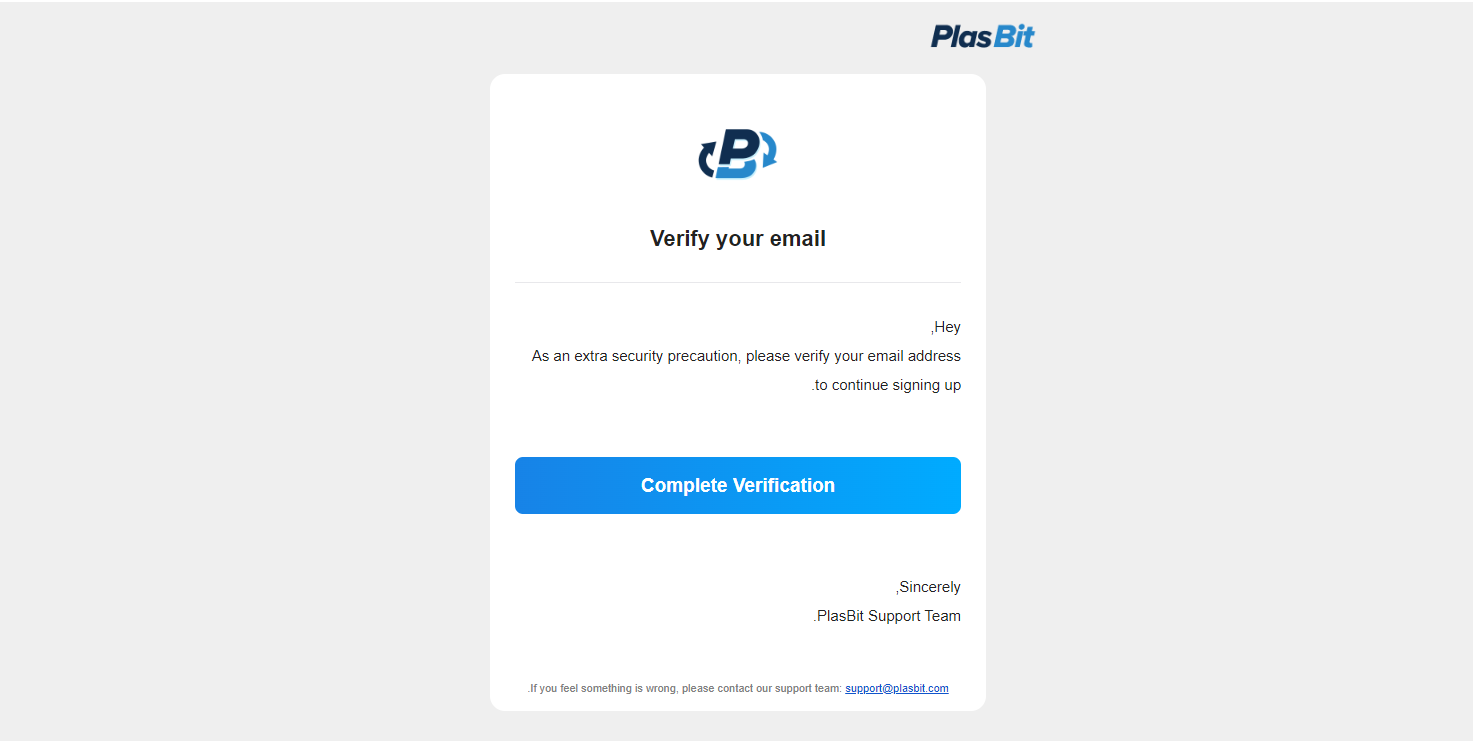
3. Enable two-factor authentication: To ensure maximum security for your account, complete two-factor verification using your phone number or Google Authenticator.
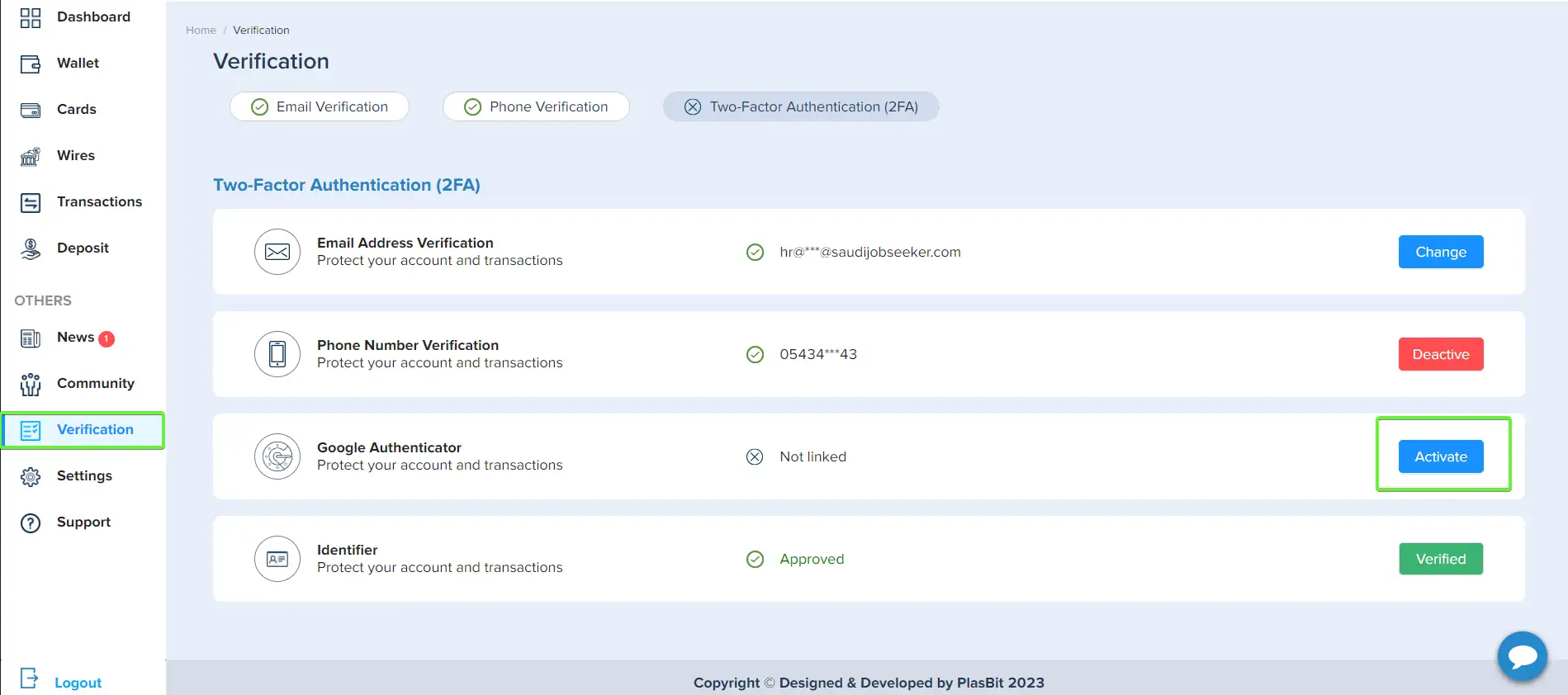
4. Access your dashboard: From now on, you will have access to all our services, including our wallet, exchange, transfers, and debit cards.
5. Start the transfer process: To send or receive funds securely and confidentially, go to the Wallet section of our site. From here, go to the withdraw section to begin the transfer
6. Fill in the necessary data: Fill in the spaces with the recipient's address, select the cryptocurrency, amount, and network
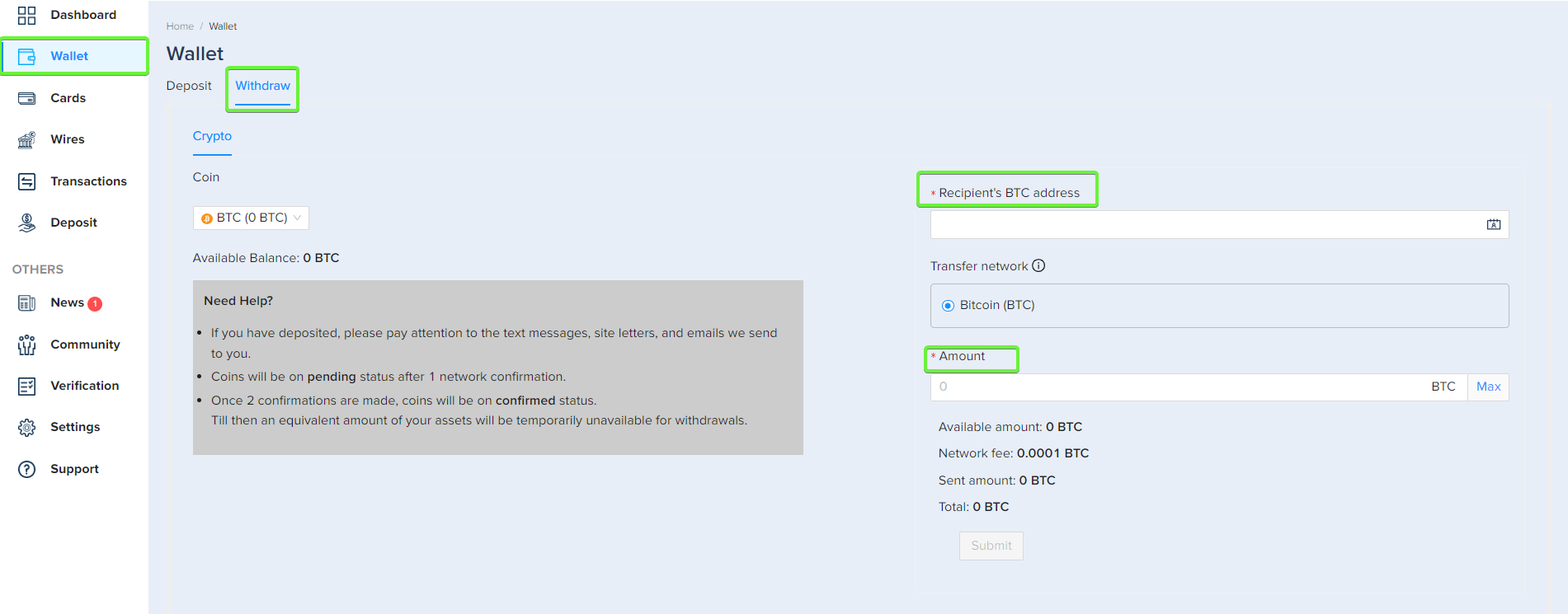
7. Complete the transfer: Double-check the data for correctness, and complete the transfer by approving the transaction with two-factor authentication.
8. Check the success of the operation: Check via your wallet's transaction history the successful completion of the transfer.
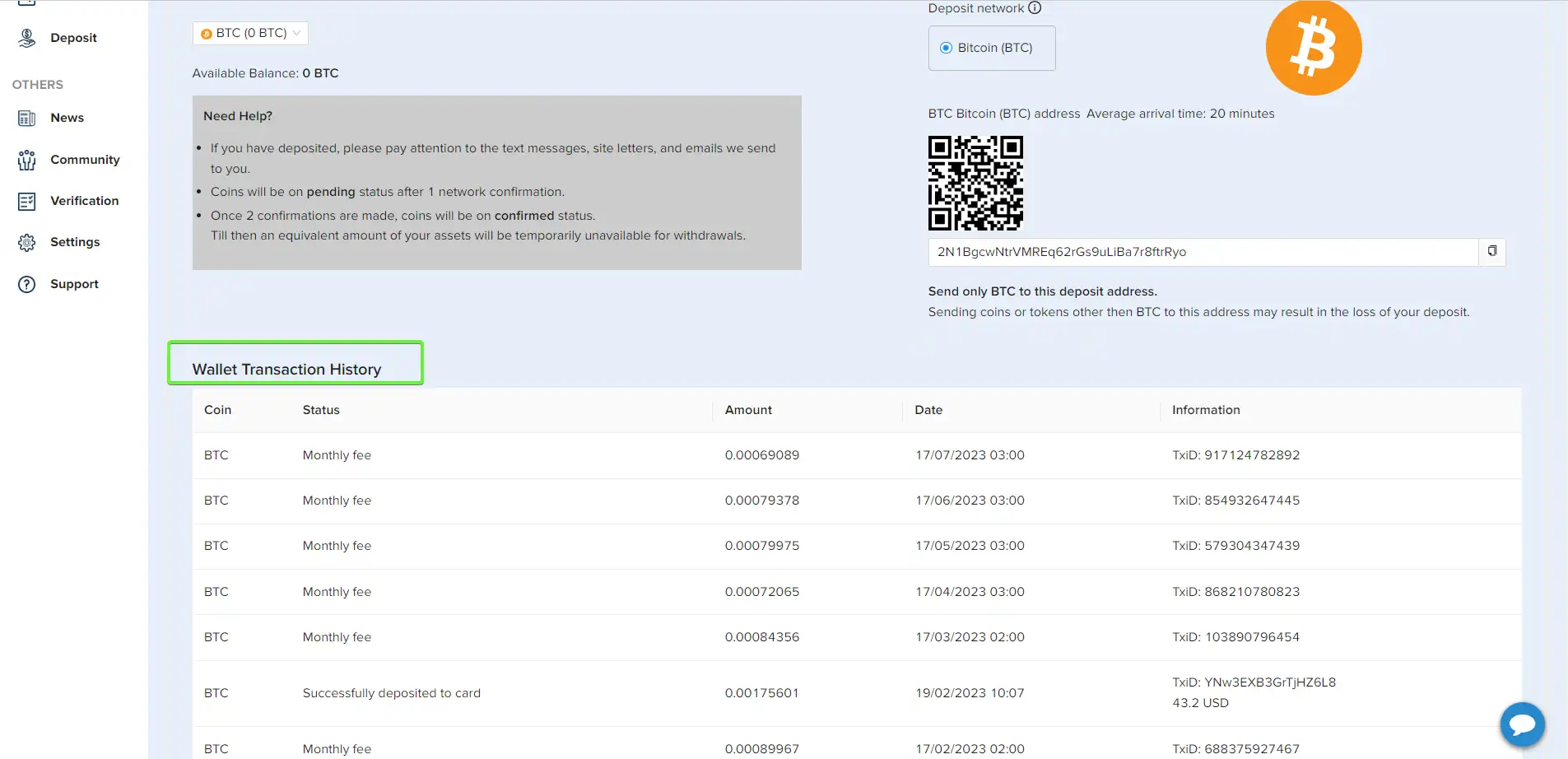
Benefits of Everyday Crypto Payments
Incorporating cryptocurrencies into your daily financial activities offers numerous advantages:
Speed: Cryptocurrency transactions typically settle faster than traditional banking systems, making them ideal for time-sensitive payments.
Global Accessibility: Cryptocurrencies are borderless, enabling you to make international payments without the delays and fees associated with traditional cross-border transactions.
Lower Transaction Fees: Cryptocurrency transactions often incur lower fees than traditional banking or payment methods, especially for international transfers.
Financial Inclusion: Cryptocurrencies can provide financial services to individuals who lack access to traditional banking systems, expanding financial inclusion.
Security: Cryptographic security measures protect cryptocurrency transactions, reducing the risk of fraud or unauthorized access. Wallet security should be the main reason for choice. PlasBit offers an online wallet that guarantees the security of your funds by storing them in cold wallets, securing them from possible hacks and scams.
Considerations for Everyday Use
While cryptocurrencies offer many benefits, it's essential to consider a few factors:
Volatility: Cryptocurrency prices can be highly volatile. Be mindful of potential price fluctuations when using them for everyday payments.
Merchant Acceptance: Verify whether the merchants or service providers you intend to transact with accept cryptocurrencies as payment. The acceptance of cryptocurrencies varies widely.
Regulatory Compliance: Understand the regulatory environment in your jurisdiction, as it can impact the use and taxation of cryptocurrencies. Compliance with local laws and tax regulations is crucial.
Security Practices: Safeguard your wallet and private keys diligently to prevent unauthorized access and potential loss of funds. Implement robust security measures and consider using hardware wallets for additional security. By embracing cryptocurrencies for everyday transactions and payments, you can leverage their unique features while adapting to the evolving digital financial system.
Ensuring the Security of Your Cryptocurrency Wallet
We will delve into wallet security's intricate and multifaceted realm, a paramount concern for any cryptocurrency holder. The safety of your cryptocurrency assets hinges on your ability to guard against many potential threats, ranging from malicious actors seeking unauthorized access to the ever-evolving world of scams and phishing schemes. Let's explore the comprehensive strategies and best practices to secure your cryptocurrency wallet.
Robust Passwords and Unbreakable Passphrases: The foundation of wallet security begins with creating passwords and passphrases that are nothing short of impregnable. Craft passwords that are a complex blend of upper and lower-case letters, numbers, and special characters. Avoid using easily guessable information like birthdates or common phrases. Passphrases, consisting of a sequence of words or sentences, offer a more secure alternative to traditional passwords. They are both more accessible for you to remember and more challenging for others to crack. Whenever available, enable 2FA for your wallet. This additional layer of security requires a one-time code from your mobile device to access your wallet, thwarting unauthorized entry.
Safeguarding Wallet Backups: Backing up your wallet's private keys or seed phrases is a non-negotiable aspect of cryptocurrency security, regularly back up your wallet's private keys or seed phrases. These backups must be stored securely, preferably in multiple physical locations such as a safe or a bank's safety deposit box. If you keep your backup digitally, encrypt it and apply a strong password. It safeguards your private keys from digital threats.
Software Updates: Maintain a vigilant approach to software updates to fortify your wallet's defenses. Keep your wallet software up-to-date, ensuring you benefit from the latest security patches and enhancements. Regularly update your device's operating system and antivirus software to defend against potential threats.
Vigilance Against Phishing and Scams: Cryptocurrency users are a prime target for phishing attacks and scams. Shield yourself with these precautions. Avoid unsolicited emails, messages, or websites requesting your wallet information or private keys. Such requests are often the telltale signs of phishing attempts. Always verify the legitimacy of cryptocurrency-related websites or apps before using them, particularly when downloading wallets or extensions.
Embrace Hardware Wallets: If security is your paramount concern, contemplate using hardware wallets. Hardware wallets maintain your private keys offline, rendering them exceptionally resistant to online threats like hacking and phishing.
Cold Storage for Long-Term Preservation: For storing cryptocurrency assets over an extended period, consider employing cold storage solutions such as paper or hardware wallets. These cold storage options are less susceptible to hacking and online attacks, making them ideal for safeguarding assets earmarked for long-term holding.
Continuous Learning and Vigilance: Staying informed about evolving security threats and cryptocurrency security best practices is pivotal. Be proactive in educating yourself about the latest security threats and emerging best practices in cryptocurrency security. Understand the risks and responsibilities associated with managing your cryptocurrency. Being vigilant and proactive in protecting your assets is an essential aspect of ownership.
Private Keys: A Treasure Beyond Measure:
The golden rule of cryptocurrency security is to keep your private keys private. Never share your private keys or seed phrases with anyone; avoid storing them digitally unless they are securely encrypted. Exercise caution when entering private keys or seed phrases online, as keyloggers and malware can surreptitiously capture this sensitive information.
Contingency Planning for Inheritance: Contemplating unforeseen circumstances, especially when you hold a significant amount of cryptocurrency, necessitates creating a clear plan for your heirs to access your funds. Share explicit instructions and access details with your chosen beneficiaries, ensuring they are stored securely.
Routine Monitoring and Surveillance: Actively surveilling your wallet and cryptocurrency balances is prudent. Periodically inspect your wallet and cryptocurrency holdings to detect unauthorized transactions or suspicious activity signs. By meticulously adhering to these comprehensive security strategies and best practices, you can erect an imposing fortress around your cryptocurrency wallet, safeguarding your digital assets against various threats.

Choosing the Best Cryptocurrency Wallet
As we draw our exploration of cryptocurrency wallets to a close, it's evident that the world of digital assets is a dynamic and ever-evolving ecosystem. The journey through this comprehensive guide has shed light on the myriad facets of cryptocurrency wallets, from their fundamental functions to the intricate details of security and management. In conclusion, here are the key takeaways:
The Essence of Cryptocurrency Wallets: Cryptocurrency wallets are essential tools that enable you to store, manage, and transact with digital assets. They come in various forms, including software, hardware, mobile, paper, web, multi-signature, and brain wallets, each offering distinct features and security measures.
Security is Paramount: Your cryptocurrency wallet's safety is paramount. Implement robust passwords, utilize hardware wallets for added security, and remain vigilant against phishing attempts and scams.
Diversify and Manage Your Portfolio: Effective cryptocurrency portfolio management involves diversification to spread risk and informed investment decisions based on research and analysis. Stay attuned to market trends, news, and technological developments that impact your investment choices.
Privacy and Anonymity: Understand the importance of confidentiality in cryptocurrency and consider using privacy-centric cryptocurrencies and wallets when necessary.
Stay Informed: The cryptocurrency system is continually evolving. Continuously educate yourself about new technologies, security threats, and best practices.
Long-Term Planning: Consider long-term planning, including inheritance and succession planning, to ensure your cryptocurrency assets are preserved and accessible to your heirs.
Adapt and Thrive: Embrace the transformative potential of cryptocurrencies and blockchain technology and adapt to the changing financial world.
Your knowledge, diligence, and security practices will serve as your compass and shield in the ever-expanding universe of cryptocurrencies. As you navigate this digital frontier, remember that responsible ownership and mindful management of your cryptocurrency wallet can lead to a prosperous and secure journey. PlasBit can assist you with all the services and information you need for a secure and confidential Web3 experience. Our exchange, our cards, and our wallet, combined with the knowledge you can gain from our educational guides, will allow you to stay ahead of the game safely and securely while maintaining your privacy. We hope this guide has provided you with the knowledge and insights needed to embark on your cryptocurrency wallet journey with confidence. May your foray into digital assets be both rewarding and secure. Thank you for accompanying us on this educational voyage, and we wish you the best in your cryptocurrency endeavors.




